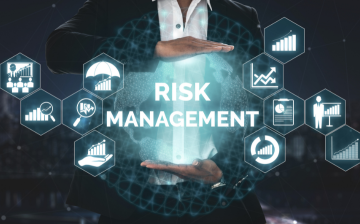
Global Risk Management Certification Courses
Global Risk Management Certification Course
Risk management has become a crucial pillar for every organisation in the global business environment. Be it finance, banking, insurance, or manufacturing, companies are always in search of professionals capable of identifying, analysing, and mitigating potential risks.
One of the most effective ways to gain professional expertise and enhance employability in this growing field is by pursuing a risk management course.
This article discusses a global risk management course, what it offers, it’s importance, and how institutions such as the Global Risk Management Institute (GRMI) are helping professionals build strong careers in this domain.
What is a Risk Management Course?
A risk management course equips students with frameworks, methodologies, and tools to address organisational risks effectively. These programmes teach learners how to assess uncertainties that could impact company performance, profitability, and reputation.
Courses cover financial, operational, and enterprise risks, as well as compliance, governance, and enterprise-wide risk systems. Such training is valuable for students, working professionals, or anyone in finance or business backgrounds.
Completing a risk management course ensures that you can contribute meaningfully to any organisation that prioritises stability and long-term growth.
Risk Management Courses Available Worldwide
The global education market offers diverse risk management courses catering to learners at different career stages. The following are the most common types:
Postgraduate Diploma Programmes
A Risk Management Diploma provides in-depth knowledge of enterprise risk, credit risk, operational risk, and market risk. These courses typically last six months to one year. They are ideal for graduates who want to specialise in risk functions without completing a full degree.
For advanced learners, the Post Graduate Diploma in Risk Management (PGDRM) delivers comprehensive knowledge of risk governance, data-driven analysis, and real-world case studies. Institutes such as GRMI offer industry-aligned modules with mentorship from international risk experts.
Professional Certification Courses
Universities and institutes worldwide offer short-term Risk Management Certificate programs. These certifications focus on niche areas such as compliance risk, enterprise risk, or financial risk.
They benefit working professionals seeking to upgrade existing skills or transition to risk management roles.
Online and Hybrid Programmes
Online risk management courses provide flexibility for learners with busy schedules. They include conceptual lectures, virtual labs, and online assessments.
Some institutions partner with business schools to offer hybrid courses that combine online learning with practical exposure.
Topics Covered in a Risk Management Course
Risk management programmes typically cover both theoretical knowledge and practical applications. Key areas include:
- Enterprise Risk Management (ERM): Understanding organisational risk frameworks across all operations.
- Credit and Market Risk: Analysing financial risks, defaults, and investment exposure.
- Operational Risk: Managing risks related to people, processes, and systems.
- Compliance and Governance: Ensuring adherence to laws, standards, and ethical practices.
- Quantitative Analysis: Using statistical models and data analytics to measure and mitigate risk.
- Strategic Risk Planning: Creating long-term mitigation strategies aligned with corporate objectives.
This comprehensive curriculum prepares learners to address complex real-world business challenges effectively.
Benefits of a Global Risk Management Certification
Enrolling in a global risk management certification course offers multiple advantages:
- International Recognition: A certification from a globally recognised institute enhances credibility and profile visibility.
- High Demand Across Industries: Risk professionals are needed in finance, IT, healthcare, logistics, and more.
- Career Advancement: Certifications can accelerate career progression from junior roles to Risk Analyst, Risk Consultant, or Chief Risk Officer (CRO).
- Skill Enhancement: Courses develop analytical, strategic, and problem-solving skills essential for decision-making under uncertainty.
- Networking Opportunities: Programs such as GRMI’s PGDRM include workshops, internships, and live case studies, providing access to industry leaders.
Career Prospects After a Risk Management Course
Completing a risk management course opens a wide range of career opportunities globally. Key roles include:
- Risk Analyst
- Enterprise Risk Manager
- Credit Risk Specialist
- Market Risk Analyst
- Compliance Officer
- Risk Consultant
- Chief Risk Officer (CRO)
These roles are not limited to financial institutions. Manufacturing, healthcare, retail, and technology sectors increasingly require risk professionals to ensure compliance and operational stability.
Skills Developed in a Risk Management Course
Risk management courses blend technical and soft skills, improving overall professional competence. Key skills include:
- Critical and analytical thinking
- Data interpretation and visualisation
- Regulatory compliance understanding
- Strategic planning and forecasting
- Effective communication and leadership
These competencies enable professionals to manage organisational risks effectively and contribute to long-term business success.
Global Demand for Risk Management Professionals
As companies expand operations internationally, the demand for qualified risk professionals rises. Organisations seek candidates capable of delivering growth and stability.
Risk management professionals are increasingly needed in India, Europe, the Middle East, and other regions. Global employment trend reports indicate steady growth in demand due to financial uncertainty, regulatory changes, and digital transformation.
Conclusion
A risk management course is more than an academic qualification; it is an investment in a career. It provides international exposure, practical knowledge, and a competitive edge in a dynamic business environment.
Institutions such as GRMI play a key role in producing future-ready professionals equipped to manage complex risks effectively.
For anyone seeking a career that combines analytical rigour, strategic thinking, and leadership potential, enrolling in a global risk management certification or a PGDRM program is an excellent starting point.
FAQ’s
Q1: How long does a Risk Management Course take?
Ans: Duration ranges from a few weeks for certificate programs to 6–12 months for diploma or PGDRM programs.
Q2: Who can enrol in a Risk Management Course?
Ans: Graduates, finance professionals, and those interested in governance, audit, or compliance are eligible.
Q3: What career opportunities are available after a Risk Management Course?
Ans: Graduates can work as Risk Analysts, Compliance Officers, or Enterprise Risk Managers in banking, consulting, insurance, or technology.
You may also like

High-Demand Professional Courses in 2025

Best IT Courses and Certifications for Career Growth | 2025


